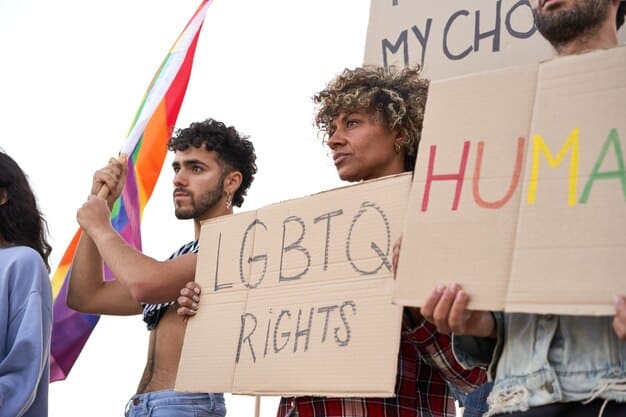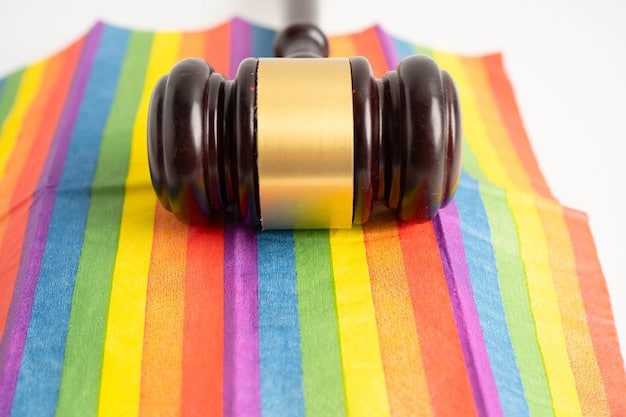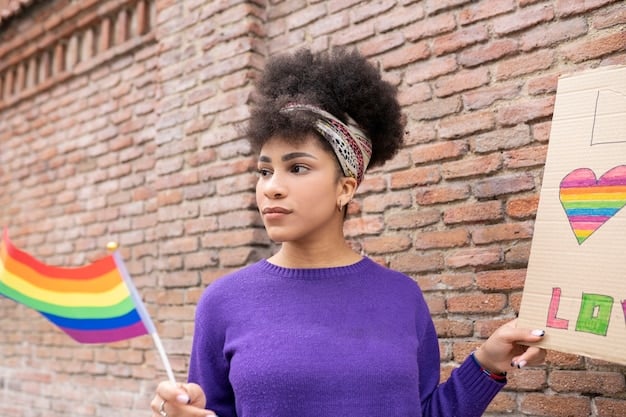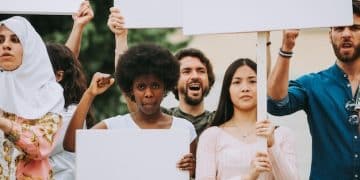LGBTQ+ Rights: Emerging Challenges & How US Allies Can Help

The fight for LGBTQ+ rights continues with new legal challenges arising, demanding that allies in the US stay informed and proactive to support equality and justice.
The legal landscape for LGBTQ+ individuals in the United States is constantly evolving. The fight for LGBTQ+ rights: What Are the Emerging Legal Challenges and How Can US Allies Help? is a critical question as new battles emerge against hard-won freedoms, impacting everything from healthcare to marriage equality.
Understanding the Current State of LGBTQ+ Rights
The journey toward equality for LGBTQ+ individuals has seen significant progress. However, understanding the current state involves acknowledging both the milestones achieved and the persistent challenges that remain. An honest assessment of these factors is the first step in supporting the fight.
Numerous federal and state laws have historically discriminated against individuals based on their sexual orientation or gender identity. Over the years, activists and advocates have tirelessly worked to challenge these laws, pushing for a more inclusive and equitable legal framework. Despite notable victories, the struggle is ongoing.

Emerging Legal Challenges Facing the LGBTQ+ Community
Recent legislative actions in various states are creating new hurdles and threatening established protections. These challenges are evolving quickly and demand careful attention from those committed to supporting LGBTQ+ equality. Understanding these challenges is critical for allies.
Healthcare Restrictions
Some states are introducing laws that restrict access to gender-affirming care for transgender youth. These laws often target medical professionals, imposing penalties for providing treatments deemed appropriate by medical consensus. For instance, some mandates require parental consent or outright ban certain procedures.
Religious Freedom Exemptions
Another emerging challenge involves the expansion of religious freedom exemptions. These exemptions allow individuals and businesses to refuse services to LGBTQ+ individuals based on religious beliefs. While intended to protect religious expression, critics argue that they lead to discrimination.
- Denying services to same-sex couples
- Refusing to provide healthcare to transgender individuals
- Challenging anti-discrimination laws in employment
These exemptions are particularly concerning because they can undermine existing civil rights laws. The debate revolves around balancing religious freedom with the right to equal treatment under the law. It’s a complex issue with wide-ranging implications.
How Allies Can Advocate for LGBTQ+ Rights
Allies play a crucial role in the fight for LGBTQ+ rights. Their support, whether through advocacy, education, or financial contributions, can make a significant difference. There are many direct actions and steps allies can take to support the community.
Supporting Organizations and Initiatives
Donating to or volunteering with organizations dedicated to LGBTQ+ advocacy is a valuable way to contribute to the movement. These groups often spearhead legal challenges, provide resources to LGBTQ+ individuals, and educate the public on important issues. Many impactful charities exist and are worth supporting.
Educating Yourself and Others
Staying informed and educating others on LGBTQ+ issues can help foster a more inclusive environment. Sharing information on social media, engaging in conversations with family and friends, and participating in community events can all contribute to raising awareness. Even small conversations can have a big impact.

The Role of Legal Advocacy and Litigation
Legal advocacy remains a vital component in protecting and expanding LGBTQ+ rights. Strategic litigation can challenge discriminatory laws, set legal precedents, and create systemic change. Several notable cases have already paved the way.
Landmark Cases and Their Impact
Cases like Obergefell v. Hodges, which legalized same-sex marriage nationwide, demonstrate the transformative power of legal challenges. These cases establish crucial protections and set the stage for continued progress. The impact has been huge, and can still be felt today.
Future Legal Battles on the Horizon
As emerging legal challenges arise, new battles are on the horizon. These may include cases involving transgender rights, healthcare access, and religious freedom exemptions. Allies can support these efforts by backing legal organizations and advocating for inclusive policies.
- Supporting court cases that challenge discrimination
- Advocating for comprehensive anti-discrimination laws
- Protecting the rights of transgender individuals
The legal fight is far from over, and continued vigilance is essential. Allies need to stay informed and be ready to support these legal challenges.
Addressing Discrimination in the Workplace
The fight for LGBTQ+ rights extends to the workplace, where discrimination remains a persistent issue. Creating inclusive and equitable workplaces requires a multifaceted approach, involving policies, training, and a commitment to fostering a welcoming environment.
Implementing Inclusive Policies
Companies can implement policies that protect LGBTQ+ employees from discrimination. These policies should cover a range of issues, including hiring, promotion, benefits, and workplace conduct. Training is also beneficial, but action is also a necessity.
Creating a Supportive Work Environment
Beyond policies, creating a supportive work environment is crucial. This can involve promoting open dialogue, establishing employee resource groups, and providing sensitivity training to all staff. Feeling supported at work can have a huge impact on an employee’s life.
The Intersection of LGBTQ+ Rights and Social Justice
The fight for LGBTQ+ rights is intrinsically linked to broader social justice movements. Issues of race, class, gender, and immigration status often intersect to create unique challenges for LGBTQ+ individuals. Recognizing these intersections is crucial for effective advocacy.
Understanding Intersectionality
Intersectionality refers to the interconnected nature of social categorizations such as race, class, and gender, which create overlapping systems of discrimination or disadvantage. Addressing these intersections requires a collaborative and inclusive approach to advocacy. This isn’t about one or another, but both.
Building Coalitions
Building coalitions with other social justice movements can amplify the impact of advocacy efforts. By working together, diverse groups can leverage their collective strength to address systemic inequalities. This strengthens allyship as a whole.
Recognizing the interconnectedness of these issues and working collaboratively, allies can help create a more just and equitable society for all. The fight isn’t just for the LGBTQ+ community, but for everybody.
| Key Point | Brief Description |
|---|---|
| ⚖️ Legal Challenges | Restrictions in healthcare and religious exemptions threaten LGBTQ+ rights. |
| 🤝 Ally Support | Allies can advocate by supporting organizations, educating others, and backing legal efforts. |
| 🏢 Workplace Inclusion | Creating inclusive policies and supportive environments is essential in the workplace. |
| 🌍 Social Justice | LGBTQ+ rights are linked to broader social justice, requiring intersectional advocacy. |
Frequently Asked Questions
▼
Legal challenges often involve healthcare restrictions, religious freedom exemptions, and discrimination in housing, employment, and public accommodations. These issues vary by location and change often with new legislation.
▼
Effective allyship includes educating yourself, supporting LGBTQ+ organizations, advocating for inclusive policies, and speaking out against discrimination. Support matters, but it’s not a replacement for systemic action and change.
▼
Gender-affirming care includes medical, psychological, and social support for transgender individuals. It’s vital for their well-being and aligns with medical consensus. Often, this is denied for transgender youth, impacting their health.
▼
Religious freedom exemptions can allow individuals and businesses to deny services to LGBTQ+ people based on religious beliefs, leading to discrimination. Balancing rights is a complex task with wide-ranging ethical considerations.
▼
Intersectionality recognizes that social categorizations like race, class, and gender create overlapping systems of discrimination. It’s important because LGBTQ+ individuals face unique challenges based on these overlapping identities.
Conclusion
The fight for LGBTQ+ rights is an ongoing endeavor, requiring sustained effort from allies and advocates. By staying informed, supporting LGBTQ+ organizations, and advocating for inclusive policies, we can create a more just and equitable society for all. It is critical to fight back against restrictions.





